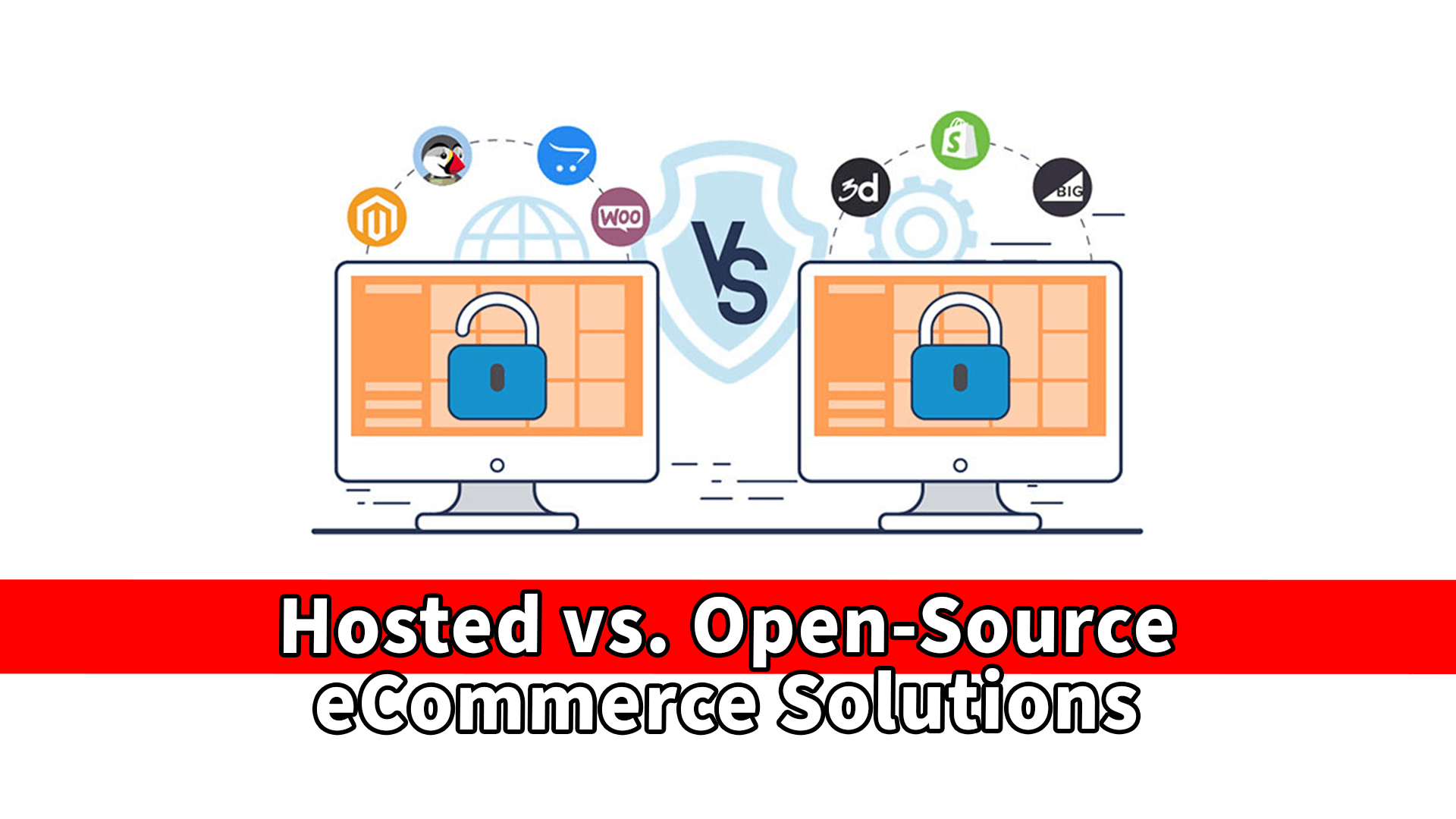There are many new eCommerce solutions and platforms that are popping up. These technologies include open-source solutions, headless solutions as well as some hosted enterprise systems. The reason that we see many new solutions is that eCommerce Businesses are looking for specific solutions to operational and scalability challenges. Limitations with product options, limitations with direct integrations, usability issues and conversion optimization issues are just a few to mention.
There’s a lot of headless eCommerce technology now. Headless eCommerce allows you to have the product display in the front end on one system or CMS, and the checkout process on another. (Website on WordPress and checkout on Bigcommerce or Shopify.)
Open-Source Vs. Hosted Platforms
What is the difference between open-source and hosted solutions?
Hosted solutions are very straightforward: they include Shopify, BigCommerce, Volusion, 3dcart, and Miva. Open source solutions are ones such as Magento and WooCommerce.
Many OpenCart or X-Cart versions are old. Then, you have WooCommerce and WordPress. WordPress is a viable option if you have less than 50 products.
Hosted means that it’s hosted with a company and you’re renting their technology on a monthly basis. Shopify is an example of this arrangement. They update their technology on a monthly or quarterly basis. You get a bunch of new features every quarter in exchange for a monthly fee. The moment you stop paying for a hosted server, you don’t have a website anymore. Many business owners feel this is not a fair agreement.
Open source means that you can take an OpenCart, Magento, or WooCommerce installation, installing it on any server or any hosting account. Not only do you own the data, but you also own the servers or code to that specific platform as well.
Clients say, “I want to do ABCD. Here are my objectives and business growth plan.” The team’s goal is to convince them to find a platform that fits those objectives. Despite the fees, hosted sites are better.
How do you convince a client?
Developers look at their business model, back-end operation, products, average order values, margins, and options for higher product sale volumes or price points. You need to factor in these aspects when making that decision for a hosted or open source.
Another factor would be the functionality that the business needs to operate. In many cases, your standard hosted solution will have out-of-the-box functionalities that any standard eCommerce business owner will need, therefore reducing the cost of hiring a developer or creating that functionality.
The more complex of functionality that you need, the more likely you will need an open-source server. Open-source allows you to build proprietary technology that you need to build to run your eCommerce store.
The answer depends. It’s a customized approach to what you need as an eCommerce business and what kind of solution you need when thinking about an eCommerce platform. Industrial B2B businesses are seeing the potential of eCommerce, and they’re moving more to eCommerce. They work with machinery, parts, and manufacturers. These are old-fashioned folks.
They want to control their data. They’re scared to pay somebody monthly for the rest of their lives, so they lean towards open source more. There are a couple of questions that determine the type of commerce platform.
Deciding On eCommerce Features
First, what features do you want? BigCommerce, Shopify, WooCommerce, and WordPress have different tradeoffs and benefits.
The answer is pretty simple to make an informed decision. Number one, do you have hundreds of products? If you have hundreds or thousands of products, you probably should be on a hosted cart.
Number two is controlling data. You don’t want to pay a server forever to manage this information. The cost of ownership of having an eCommerce site is going to be significantly higher with open source. You will not get those technology updates from an eCommerce platform that has merchants that do millions of dollars. The business owner may prefer WordPress or WooCommerce because they can control and customize it.
Some companies own data and prefer to keep it that way. The challenge is that you’ll pay a company like me forever for support. Because with open source, there’s a big chance that when you edit a code here, something else is going to break here. That’s why every single business that runs an open-source solution that does more than $6 million probably has a dedicated developer that’s working on that website. But you don’t need that on Shopify and BigCommerce.
We have clients on BigCommerce that do 10, $20 million, clients on Shopify that do 10, 20, $30 million. They don’t have a dedicated team of developers that work on it. They might do projects from time to time, but they don’t have to pay monthly. That is the primary difference.
However, if you have a subscription-based business and want to earn a million dollars in revenue with one or two products, you don’t need to be on Shopify. A WordPress WooCommerce site will do.
Suppose you have 2,000 people simultaneously trying to check out on that website. Then the carrying capacity becomes a problem. Open source code is different from hosted core code because the hosted sites need to pay attention to that checkout. That checkout can not break.
Why Hosted eCommerce Platforms Are Preferable
Generally, Optimum7 suggests hosted solutions more than open-source solutions. The other side of this coin is that new technologies and platforms are appearing.
There is a lot of new technology and new eCommerce that are trying to grab market share. For people serious about making millions of dollars, merchants send most of the requests to go to enterprises. They usually earn more than 40 million in revenue. Enterprise is a nightmare and not a recommendation.
What do you think about the eCommerce environment when you look at this open-source, hosted, and enterprise? What will the solutions look like in five to ten years?
Marketers will see an increase in hosted eCommerce stores. Technology is consistently going to evolve with your store while you’re just paying the same monthly rate. You wouldn’t need to hire a developer to implement any additional technology. Meanwhile, app stores are growing at a breakneck pace.
The need for a developer on a Shopify or BigCommerce store will decrease tremendously. You can implement any additional functionality or third-party API tool into their site without an expert. As these integrations and apps grow, more eCommerce store owners will lean towards hosted solutions.
Are you thinking about moving from open source to a hosted platform,? Migration depends on your operation. If you’re earning more than half a million dollars, do the move regardless. You can scale more easily in a hosted solution because the technology is there than in an open-source solution like WooCommerce.
Suppose you have hundreds or thousands of products. The moment that you migrate or start on a hosted cart solution, you’re going to see a push in your organic visibility and orders. Why? The new solution will make navigation to checkout easier for your customers.
The challenge is many industrial facilities, make or larger businesses want to control the technology, data, or databases. They’re paranoid about being on the servers of another company, regardless of how big they are, like Shopify or BigCommerce. Paranoia will still pose a challenge when convincing the C levels that this is the right move.
The team must convince decision-makers in larger organizations or industrial businesses. Hosted solution benefits include better returns, ROI, and orders 95% of the time. An exception for an open-source or even a custom solution is if you perform at a different level.
If you earn more than sixty or seventy million, you might need to be on an enterprise solution like Salesforce, CloudCommerce, Episerver, or Sitecore. Even though some of these platforms are older enterprises, they can still customize your backend processes pretty efficiently.





